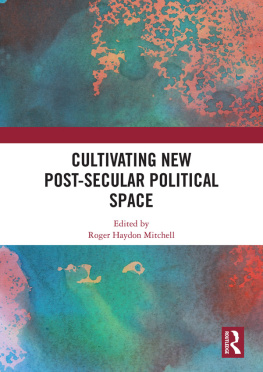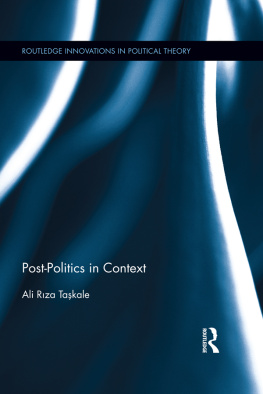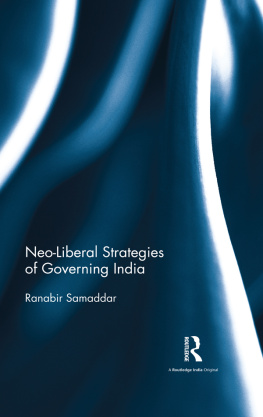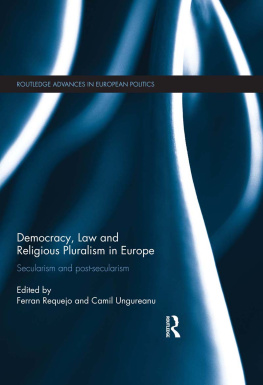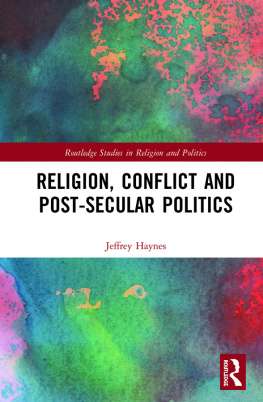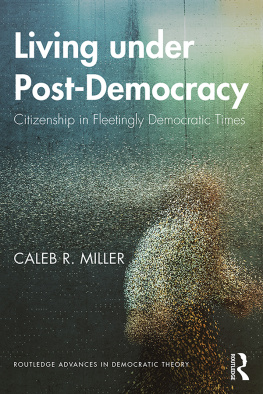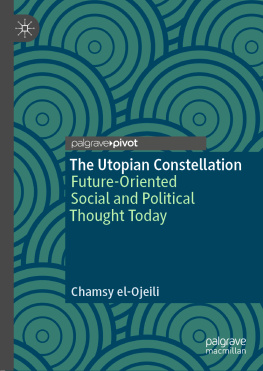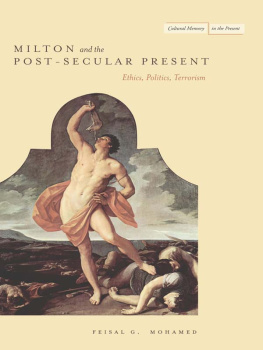Cultivating New Post-secular Political Space
This comprehensive volume provides crucial insights from contemporary academics and practitioners into how positive interventions might be made into post-secular political spaces that have emerged in the wake of the economic, political, and social upheavals of the 2008 global financial crisis. The failure of liberal democracy to deal effectively with such challenges has led to scapegoating of the poor, immigrants, and Muslims, and contributed to the populist electoral success of, among others, the Leave campaign during the 2016 United Kingdom European Union membership referendum, and Donald Trumps Presidential campaign. These shocks have highlighted contemporary political spaces defined by what has been termed all the posts: postmodern, post-Christendom, post-liberal, post-political, and post-secular.
This collection examines emerging attempts to understand and advance the cause of well-being within this context. The authors address a variety of key issues including the following: (re)configuring mythologies for the common good, deploying love and friendship politically, motivating new social movements, valuing the other, recovering displaced and devalued political narratives, finding alternatives to the previously dominant neo- liberalism, listening deeply for social transformation, and overcoming adversarial party politics.
This book was originally published online as a special issue of the journal Global Discourse.
Roger Haydon Mitchell Formerly an Honorary Research Fellow in the Department of Politics, Philosophy and Religion at the University of Lancaster, UK, he is now Political Theologian with the Westminster Theological Centre, UK.
First published 2019
by Routledge
2 Park Square, Milton Park, Abingdon, Oxon, OX14 4RN
and by Routledge
52 Vanderbilt Avenue, New York, NY 10017
Routledge is an imprint of the Taylor & Francis Group, an informa business
2019 Taylor & Francis
All rights reserved. No part of this book may be reprinted or reproduced or utilised in any form or by any electronic, mechanical, or other means, now known or hereafter invented, including photocopying and recording, or in any information storage or retrieval system, without permission in writing from the publishers.
Trademark notice: Product or corporate names may be trademarks or registered trademarks, and are used only for identification and explanation without intent to infringe.
British Library Cataloguing-in-Publication Data
A catalogue record for this book is available from the British Library
ISBN13: 978-0-367-23677-9
Typeset in Myriad Pro
by codeMantra
Publishers Note
The publisher accepts responsibility for any inconsistencies that may have arisen during the conversion of this book from journal articles to book chapters, namely the inclusion of journal terminology.
Disclaimer
Every effort has been made to contact copyright holders for their permission to reprint material in this book. The publishers would be grateful to hear from any copyright holder who is not here acknowledged and will undertake to rectify any errors or omissions in future editions of this book.
Contents
Roger Haydon Mitchell
Timothy Stacey
Anna Rowlands
Roger Haydon Mitchell
Andy Knox
Astrid H.M. Nordin and Graham M. Smith
Adam Roberts
Benjamin J. Wood
Elaine Graham
Sue Mitchell and Francisco Jose Eiroa-Orosa
Hannah Intezar and Paul Sullivan
Bradley Jersak
Ron S. Dart
Guide
The chapters in this book were originally published in the journal Global Discourse, volume 8, issue 4 (December 2018). When citing this material, please use the original page numbering for each article, as follows:
Chapter 1
- Introduction: Cultivating new post-secular political space
- Roger Haydon Mitchell
- Global Discourse, volume 8, issue 4 (December 2018) pp. 567572
Chapter 2
- Beyond populist politics: why conventional politics needs to conjure myths of its own and why it struggles to do so
- Timothy Stacey
- Global Discourse, volume 8, issue 4 (December 2018) pp. 573588
Chapter 3
- Between radical orthodoxy and the turn to the empirical: a reply to Stacey
- Anna Rowlands
- Global Discourse, volume 8, issue 4 (December 2018) pp. 589591
Chapter 4
- What are the politics of love?
- Roger Haydon Mitchell
- Global Discourse, volume 8, issue 4 (December 2018) pp. 592609
Chapter 5
- Examining self-love, love of the other and love of the enemy: a reply to Mitchell
- Andy Knox
- Global Discourse, volume 8, issue 4 (December 2018) pp. 610614
Chapter 6
- Friendship and the new politics: beyond community
- Astrid H.M. Nordin and Graham M. Smith
- Global Discourse, volume 8, issue 4 (December 2018) pp. 615632
Chapter 7
- Friendship in politics, community, populism and liberalism: a response to Nordin and Smith
- Adam Roberts
- Global Discourse, volume 8, issue 4 (December 2018) pp. 633638
Chapter 8
- The decay of Western liberalism and the Christological alternative
- Benjamin J. Wood
- Global Discourse, volume 8, issue 4 (December 2018) pp. 639655
Chapter 9
- The decay of western liberalism and the christological alternative: a reply to Ben Wood
- Elaine Graham
- Global Discourse, volume 8, issue 4 (December 2018) pp. 656658
Chapter 10
- Love your enemy? An aesthetic discourse analysis of self-transcendence in values-motivated altruism
- Sue Mitchell and Francisco Jose Eiroa-Orosa
- Global Discourse, volume 8, issue 4 (December 2018) pp. 659679
Chapter 11
- Carving a dialogical epistemology for investigating altruism: A reply to Mitchell and EiroaOrosa
- Hannah Intezar and Paul Sullivan
- Global Discourse, volume 8, issue 4 (December 2018) pp. 680684
Chapter 12
- Transcending the tribalism of the culture wars spectrum
- Bradley Jersak
- Global Discourse, volume 8, issue 4 (December 2018) pp. 685704
Chapter 13
- Neo-Gnosticism, ideology and the culture wars: the contemplative antidote perennial tensions: a reply to Jersak
- Ron S. Dart
- Global Discourse, volume 8, issue 4 (December 2018) pp. 705710
For any permission-related enquiries please visit: http://www.tandfonline.com/page/help/permissions
Ron S. Dart is an Associate Professor of Political Science and Religious Studies at the University of the Fraser Valley, Abbotsford, Canada. He is the Political Science Advisor to the Stephen Leacock Home/Museum and is on the National Executive of the Thomas Merton Society of Canada.
Francisco Jose Eiroa-Orosa is Marie Skodowska-Curie Researcher in the Department of Clinical Psychology and Psychobiology at the University of Barcelona, Spain, and a Senior Lecturer in Positive Psychology and International Humanitarian Psychosocial Consultation at the University of East London, UK.

